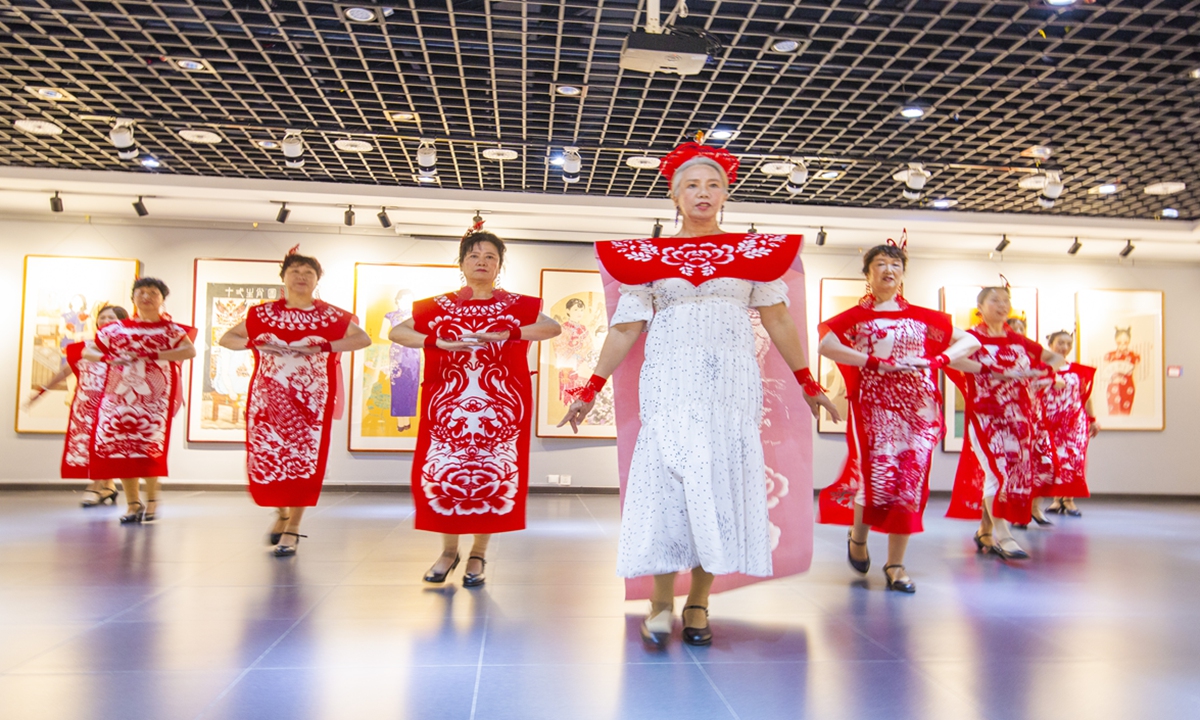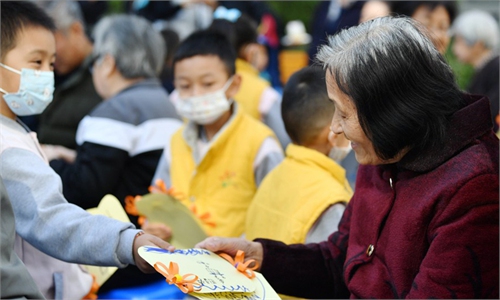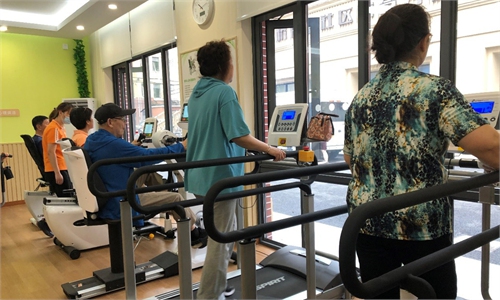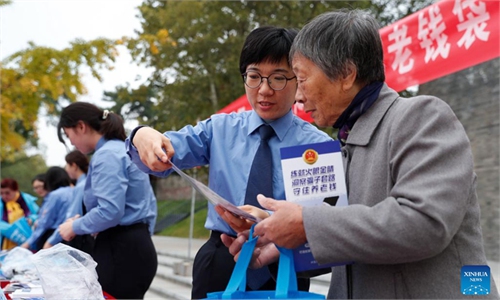Lawmakers, political advisors make proposals to address trend of aging population at local two sessions
‘Silver economy’ to become more prominent part of economic growth

Elder models present paper cut qipao, or Chinese long gown, at an art museum in Shenyang, Northeast China's Liaoning Province. Photo: IC
As the number of elderly people continues to grow, ensuring that they are well taken care of and have support in their senior years has become a major concern for the whole of society. During the recent local two sessions period, lawmakers and political advisors have put forward various suggestions to help address the urgent issues faced by the elderly in terms of elderly care, which experts said on Tuesday will produce significant effects and alleviate the challenges brought about by current elderly care issues from multiple perspectives and levels.
As of the end of 2022, the elderly population aged 60 and above in China reached 280 million, accounting for 19.8 percent of the total population. In order to actively respond to the aging population, foster new economic growth drivers, and improve the quality of people's lives, the State Council, China's cabinet, on January 15 unveiled a sweeping guideline on promoting the development of the "silver economy," or the elderly care industry.
"With an increasingly aging population, the role of the 'silver economy' as part of China's national economy will become more and more important. Its proportion in consumption, investment and total demand will become higher and higher," Li Chang'an, a professor at the Academy of China Open Economy Studies of the University of International Business and Economics, told the Global Times on Tuesday.
On Tuesday, officials from the Ministry of Civil Affairs stated during a routine press conference that the country will support the local exploration of including high-skilled aged care professionals in the scope of urban household registration, providing them with the necessary protection and more care.
Facing the continuous growth of the elderly population, many places such as Hebei, Anhui, and Liaoning provinces have provided home-based age-friendly renovations and home-based elderly care support services for special and vulnerable elderly people.
Zhang Chuan, a young lawmaker from Hunan Province, proposed to develop a pilot program for mutual support elderly care in rural areas, which not only meets the basic needs of the elderly such as food, accommodation, and medical care, but also enriches their various spiritual needs. Zhang found that there is an increasing number of empty-nesters in rural areas, and these elderly people have a strong attachment to their hometowns. When they get older, they are unwilling to leave their hometowns and move to the cities with their children. "How can we ensure the elderly to enjoy their senior years in the familiar and adapted rural areas?" Zhang and his colleagues began to consider this major issue, the Global Times learned on Tuesday.
In May 2023, Zhang started exploring the mutual support elderly care model in his village. They established a senior citizens' association in the village, including physically fit and relatively younger elderly people, and then provided assistance to those who were physically weak and older. While meeting the normal living needs of the elderly, they also organized activities such as chess, singing, and square dancing to satisfy their spiritual needs.
Although it is still in the exploratory stage, after half a year, Zhang found that this model might be one of the solutions for rural elderly care, effectively addressing issues such as daytime care, emotional communication, cultural and recreational activities, and spiritual comfort for the elderly.
In the Hepan community of Dadong district, Shenyang, Northeast China's Liaoning Province, 90-year-old Meng Guizhen solved the problem of bathing difficulty by making an appointment with a specialized bathing service organization. Wu Chunying, a deputy to the Liaoning Provincial People's Congress, said that through policy guidance, the community have gathered more service resources "by their side" for the elderly, helping them enjoy a happy old age without leaving their homes.
In Qinghai Province, 234 urban community day care centers and 1,403 rural mutual assistance happiness homes have been established. Among them, Xining city, the provincial capital, has established more than 270 cafeterias and elderly homes in urban communities and suburban villages by introducing catering companies and establishing subsidy systems.
Focusing on the medical needs of the elderly, many places are actively exploring new ways of integrating medical care and elderly care, and strengthening policy and institutional guarantees. Relying on the strength of grass-roots health clinics, Nanxun district in Huzhou, East China's Zhejiang Province, actively builds rehabilitation nursing homes with outstanding rehabilitation functions and forms an orderly referral mechanism with hospitals.
Wu Xiaoli, a deputy to the Zhejiang Provincial People's Congress, said that Nanxun district has established a dispatch center based on home bed management, accurately dispatching medical resources throughout the district to serve the elderly. In the future, by expanding the coverage of long-term care insurance and enriching digital means, home-based elderly care people can enjoy more timely and effective medical services.
The population aged 60 and above in Beijing, a mega-city with a population of 20 million, has exceeded 20 percent, with existing elderly care institutions and beds still unable to meet the demand. At the ongoing 16th Beijing Municipal People's Congress, Liu Fang, a deputy to the Beijing Municipal People's Congress, proposed to promote the coordinated development of medical care and elderly care integration in the Beijing-Tianjin-Hebei region.
To develop the "silver economy," efforts should be made to build a national university for the elderly and open its schools to society, according to the guideline issued by the State Council, such as managing the complicated problems of TV operation, encouraging the editing and publication of large-print books suitable for the elderly, and developing literature, radio, film, television, music, short video and other content industries for the elderly.
Experts said that the current environment of China's elderly care is complex, and it needs to be solved from multiple angles and through multiple channels. The approach suggested in the above-mentioned proposals is a good reflection of local characteristics and should achieve good results, Xi Heng, professor at the School of Public Management of the Northwest University in Xi'an, Northwest China's Shaanxi Province, told the Global Times on Tuesday.
The focus of future social elderly care services in China is how to establish a multi-level elderly care service system based on home care, supported by communities, with sufficient institutional support and the integration of medical and elderly care. Additionally, expanding the supply of elderly products and services and continuously improving the quality of elderly products and services are also crucial, Xi said.



